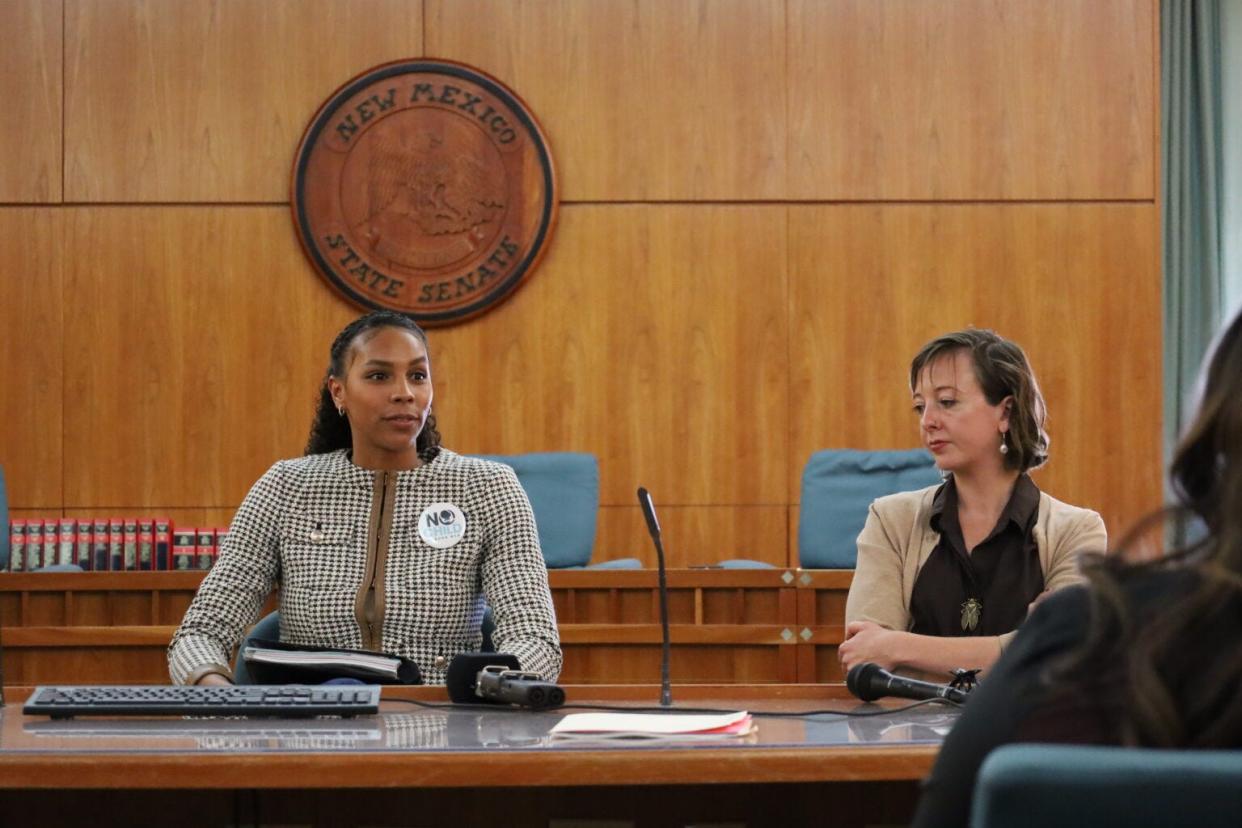N.M. Supreme Court reaffirms children’s capacity for change

This story was originally published by Source New Mexico.
A week before the Second Chance bill got through its final committee in the Legislature, another branch of government reaffirmed the importance of young people’s capacity for change, and that they should be treated differently than adults.
Senate Bill 64 would end life without parole as a sentencing option for children and, in most circumstances, provide eligibility for parole after someone serves 15 years in prison for a crime they committed when they were under the age of 18.
It has already passed through the New Mexico Senate, and the House Judiciary Committee on Monday approved it in a bipartisan 7-3 vote. If the entire House of Representatives gives approval, it would continue to Gov. Michelle Lujan Grisham’s desk.
A week earlier, the New Mexico Supreme Court published its decision in State v. Rodriguez, a case about whether young people can ever give up their rights to have their age and life circumstances be taken into account when a judge decides to send them to a juvenile facility or an adult prison.
“We are hard-pressed to conceive of a decision that cuts closer to the core of society’s interest than an election to give up on one of its children,” the Justices wrote.
In interviews with Source New Mexico, three people who worked on Rodriguez’s case said the court’s decision reaffirms that children, even those who are involved in very serious violence or harm, are capable of tremendous change and rehabilitation.
What is an amenability hearing?
Christopher Rodriguez, of Albuquerque, was 16 years old in June 2015 when the events happened that led to his case.
Like most people caught up in the criminal legal system, Rodriguez took a plea deal, which is an agreement between prosecutors and defendants that can resolve charges of criminal conduct or delinquency without having to go to trial.
Part of Rodriguez’s deal entitled him to an amenability hearing under the New Mexico Children’s Code.
State law requires judges to consider at least seven different factors during these hearings, including the child’s maturity based on their home, environmental situation, social and emotional health, brain development, trauma history and disability.
The state, at that point, has the burden to prove that they are not amenable, said Allison Jaramillo, who is representing Rodriguez in his appeal and is the go-to expert on juvenile issues among appellate public defenders in Santa Fe.
When the district court makes that finding, and when the state has presented enough evidence to convince the court, then a judge is given jurisdiction to sentence the child as an adult, Jaramillo said.
Despite overwhelming testimony from witnesses that Rodriguez was amenable to treatment and capable of reform, Second Judicial District Judge Brett Loveless found he was not, and sentenced him as an adult.
Rodriguez tried to appeal Loveless’ findings, but the Court of Appeals in 2019 unanimously said he did not have a right to appeal his conviction because whenever someone enters a plea on the underlying charges, they sign away their right to appeal the trial judge’s amenability determination.
The decision upended criminal defense practice in this area because prosecutors and defendants had struck these kinds of plea deals in many cases, Jaramillo said.
Things only got worse for Rodriguez in 2020 when the New Mexico Supreme Court denied his request to review the appeals court’s decision.
The New Mexico Coalition for the Fair Sentencing of Youth joined the Juvenile Law Center to ask the Supreme Court in March 2020 to reconsider the appeals court’s decision.
The lower court’s ruling was “disruptive to the spirit of so much of our law in New Mexico,” said Denali Wilson, an attorney with the American Civil Liberties of Union and an organizer with the Coalition.
Listen:The Reporter's Notebook Podcast, Ep. 55: Carissa McGee and Juvenile Justice
Marsha Levick, chief legal officer for the Philadelphia-based Juvenile Law Center, wrote that the Court of Appeals “ignored key differences between children and adults” that are supposed to guide these kinds of decisions.
Not only did the Supreme Court reopen Rodriguez’s case, it allowed full written and oral arguments and on Feb. 28 unanimously reversed the lower court’s ruling, concluding that a child defendant can challenge an amenability determination even if they have entered a valid guilty plea and waived their appeal rights.
The justices wrote that if they were to conclude that a juvenile defendant waived the right to appeal an amenability determination, they would make the hearing itself, state law, and past court decisions “pointless.”
They pointed to their previous decision in 2010 where they said the ability to appeal the outcome of an amenability hearing cannot “be bargained away.”
They wrote that if a court could simply “consider” the child’s amenability without actually looking at the factors required under state law, that “would reduce the amenability hearing to nothing more than window dressing” and the findings made in that hearing “nothing more than an empty shell along the path to imposing an adult sentence upon a juvenile.”
Amenability is central to whether or not we punish children as adults, or we punish them or hold them accountable and responsible in the juvenile justice system, Levick said in an interview on Monday.
The decision underscores “that’s almost a sacred right that kids have,” Levick said.
Levick said she is very grateful to see the New Mexico Supreme Court step up in the Rodriguez case and “reinforce these principles that are really central to how we treat children in this country.”
How are these things connected?
While Senate Bill 64 doesn’t deal with amenability hearings, it allows the New Mexico Parole Board to consider cases again on the back end, either 15, 20, or 25 years into the sentence, Wilson said.
All 75 people impacted by the legislation are people who either had an amenability hearing and the decision was to send the child to an adult prison, or they didn’t have one at all, Wilson said.

For children who aren’t entitled to an amenability hearing, the question of whether it’s appropriate for a child to be sent to an adult prison was never asked in the first place, Wilson said.
“We don’t even consider them at all,” Wilson said. “We say, ‘Automatically, this child is to be sentenced as an adult.’”
Jaramillo told the committee on Monday the bill would bring New Mexico in line with current brain science and psychology which recognize that young people are different from adults in important ways, including decision making, impulsivity, and response to peer pressure.
The Second Chance bill also addresses the problem of what is called “functional life without parole,” Jaramillo said, which is when someone gets a very long sentence where they might as well be sentenced to life without parole, because their parole eligibility date is when they will be either very old or dead anyways.
“It makes me hopeful to see New Mexico, both this bill having success in the Legislature, and our Supreme Court recognizing that children are different and that they need to be treated differently,” Jaramillo said.
Allowing more folks to make their case in front of the parole board earlier has everything to do with maintaining hope of actually regaining their freedom someday, Levick said.
“I have no doubts that for the men and women who are incarcerated in New Mexico who have been waiting for this opportunity, it’s all about hope, and they will hold on to that, and in most cases, hopefully, they’ll be able to come home,” Levick said.
Austin Fisher is a reporter for Source New Mexico.
Others are reading:
‘It’s like a crime scene’ what’s happened to the Rio Grande in far west Texas
Get ready to spring forward: Here's when daylight saving time 2023 begins
From the Land of Enchantment to ‘Land of Dreams’: New Mexico-filmed movie to open festival
This article originally appeared on Las Cruces Sun-News: N.M. Supreme Court reaffirms children’s capacity for change

